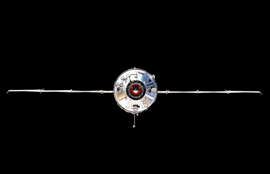
Multipurpose laboratory module “Science”
Moscow. August 4th. INTERFAX.RU – The abnormal activation of the engines of the Nauka space module was caused by the fact that after docking with the ISS, the control system of the module considered that it was still in free flight, said Sergei Krikalev, Roscosmos executive director for manned programs.
“Apparently, the module itself could not believe that it had already docked, so when the module was brought into the original control system, the control system decided that it was still in free flight, did not understand what was happening, the safety algorithm triggered, turning on the motors for a tap.” – said Krikalev in an interview with the TV channel “Russia-24” (VGTRK).
“This, of course, should not have happened, the commission is examining the reasons,” he added.
There may be consequences
Krikalev noted that the incident with the Nauka engines did not damage the ISS, but the consequences may appear in the future.
“Turning on the engines is a dynamics. The station is a rather delicate device and the Russian segment and the American segment were made as easy as possible. The additional load, it causes a load on the solar battery drives, on the farms on which all this is installed. Now, of course, experts will analyze the consequences and now it is a little early to say about the seriousness, but, of course, this is an emergency situation that will need to be analyzed in detail, “said Krikalev.
According to him, Roskosmos specialists will soon determine the consequences of the incident.
The day before, Roskosmos announced that Russian cosmonauts are scheduled to go into outer space on September 2 and 8 to integrate the module into the ISS.
On July 29, the Nauka module successfully docked to the ISS. After docking the module to the ISS, the Russian crew planned to open the hatch of the transition compartment of the Zvezda module, and then open the hatch of the Nauka module and enter the living area of the instrument-sealed compartment, but they failed to do so. Later, the MCC specialist, during negotiations with the crew, asked the cosmonauts to attach manovacuum meters to the hatch of the Nauka module to check the pressure.
Earlier, as reported by NASA, there was an abnormal start of the Nauka engines, due to which the station was turned 45 degrees. To compensate for the impulse, the engines of the Zvezda module and the Progress cargo vehicle had to be used. Roskosmos explained the incident with work with fuel leftovers in the Science module.
Postponed the Starliner flight
According to the US agency, due to the situation, the launch of the Starliner spacecraft to the ISS, scheduled for July 30, was postponed. Roscosmos said that the postponement of the launch is associated with bad weather conditions.
“The flight of the International Space Station continues according to the planned program,” the state corporation said.
The module launch dates have been repeatedly postponed. Initially, the launch of the Science module was scheduled for 2017, but was postponed to 2018 due to a blockage in the fuel system. The blockage could have provoked a breakdown of the ISS propulsion system, so the module was returned to the manufacturer for revision. Rogozin later said that the main reason for the problems with the fuel system of Nauka was not a blockage, but a defect.
The new Russian module is designed to increase the technical and operational capabilities of the ISS Russian Segment. It will ensure the possibility of implementing a scientific research program in the interests of fundamental science and the social sphere, including the development and augmentation of the resources of the Russian segment of the ISS.

